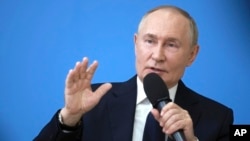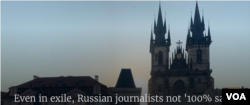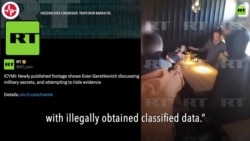In an interview with a Mongolian newspaper, Russian President Vladimir Putin this week accused the West of persecuting Russian journalists.
“In order to hide from inconvenient facts, from truthful information, the West, which considers itself the standard of freedom, has launched an open persecution against Russian correspondents,” Putin told the newspaper Onoodor.
Putin spoke with the newspaper the day before he arrived in Mongolia, where he traveled despite being under an international arrest warrant.
And the comments came just days after the Kremlin announced it was banning entry to Russia for 92 more people — mainly U.S. citizens, including several journalists — over what Moscow characterized as Washington’s anti-Russia posture.
Among those banned were The Wall Street Journal’s editor-in-chief Emma Tucker, as well as other journalists from the Journal, The New York Times and The Washington Post.
Media analysts said Putin’s comments reflect the restricted environment facing journalists in Russia.
“This is nothing new, this kind of vocabulary. But it underlines yet again that there is no independent press in Russia, especially when it comes to reporting on the war in Ukraine,” Karol Luczka, Eastern Europe Advocacy and Monitoring Officer at the International Press Institute in Vienna, told VOA.
Putin’s comments follow years of Moscow’s harsh crackdown on independent media, with dozens jailed, including local and foreign reporters, and a series of harsh laws that analysts say make independent journalism all but impossible.
Since the 2022 full-scale invasion of Ukraine, independent outlets and journalists have been forced to decamp to other countries to avoid arrest and to keep reporting on Russia. And even in exile, Russian journalists continue to face Moscow-backed harassment in a process known as transnational repression.
Putin’s claims echoed a statement that Russia’s Foreign Ministry gave VOA in August.
The Foreign Ministry declined to answer VOA’s specific questions about threats and harassment facing journalists, but a spokesperson said “protecting the rights of journalists” is the ministry’s “constant focus of attention.”
The emailed response then shared a list of instances in which foreign governments fined, banned or suspended Kremlin-run media.
Washington has imposed sanctions against some state-run Russian television stations, which it says have spread disinformation to boost Moscow’s war in Ukraine. And Canada and the European Union blocked broadcasts to Russian state-run news outlets.
Russia’s Washington embassy, meanwhile, did not immediately reply to VOA’s email requesting comment for this story.
Putin, however, maintained that news outlets operate freely in Russia.
“The only requirement for them is compliance with Russian legislation,” he said. “Foreign correspondents accredited in our country should understand this.”
Luczka said that statement was “laughable” and “not something that can be taken seriously.”
“What does respect the law mean? The laws are such in Russia that independent media cannot function — so, yes, they can function as long as they respect the law, but the law says that they cannot function,” Luczka said.
In early August, two American journalists — Radio Free Europe/Radio Liberty’s Alsu Kurmasheva and The Wall Street Journal’s Evan Gershkovich — were released from Russia, where they were held on bogus charges, in a historic prisoner swap between the U.S. and Russia. Gershkovich was accredited to report in Russia but was still arrested for his work.
Press freedom experts say their jailings underscored Russia’s disdain for media freedom.
Putin’s comments came ahead of his first trip to Mongolia in five years.
Ukraine and the European Union expressed concern that Mongolia, which is a member of the International Criminal Court, or ICC, did not act on a warrant to arrest Putin when he arrived in Mongolia on Monday.
The ICC issued an arrest warrant for Putin in 2023 over alleged war crimes committed in the war in Ukraine. As a member of the ICC, Mongolia has a responsibility to act on warrants.
Some information in this report came from Reuters.








